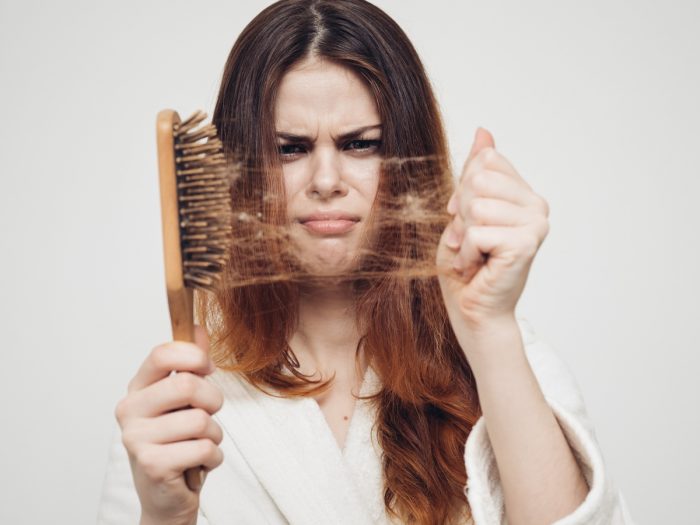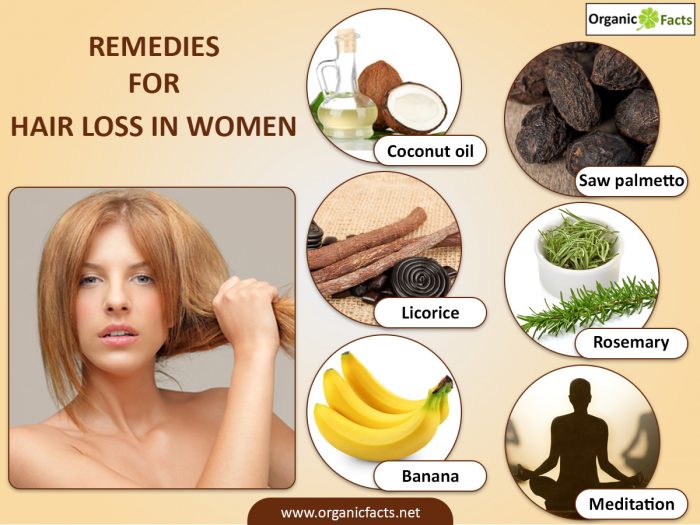Hair loss in women is a rather common condition that can lead to a lot of emotional distress and uncomfortable situations. It can also be an indicator of some major underlying health condition and, therefore, should not be ignored. Protein deficiency, stress, autoimmune disorders are some of the reasons that can cause hair loss in women.
Symptoms of hair loss can vary from being very mild to extreme. These include thinning of hair, bald patches, receding hairline, etc. There are many treatments, home remedies, and prevention available for the condition of hair loss; we have discussed them all in detail below.
Causes of Hair Loss
There are many things that can trigger hair loss. They are:
Physical or Emotional Stress
One of the very main and common reasons for hair loss in women is physical or emotional stress. Divorce, a big surgery, trauma, etc. can all be major stress-inducing factors, and, therefore, one may experience a significant amount of hair loss during this period. It happens as a result of your body putting effort into directing its resources towards getting you through the situation. Physical changes like sudden weight loss, high fever, etc., can also result in hair loss. [1]
Pregnancy
Another name for hair loss post-pregnancy is Telogen Effluvium. A fall in the estrogen levels after pregnancy leads to this condition. It mostly happens in the 3 to 6 months period after pregnancy. Telogen Effluvium is a very common cause of hair loss among women; an average of around 40% to 50% of women experience hair fall for a temporary period of time post-pregnancy. [2]
Heredity (Androgenic or Androgenetic Alopecia)
Another major cause of hair loss in women is heredity. Other names for this type of hair loss are Androgenetic Alopecia, female pattern hair loss, female pattern baldness or female pattern alopecia. A family with a history of hair loss in women will automatically make their present generation women more prone to this condition. In hereditary hair loss, the part line gradually starts thinning from the top of the head. But, it’ll suffice to say, that even in this condition, the hairline rarely recedes and almost never results in baldness. [3]
Lack of Protein
It is very important to have ample amounts of protein in your diet if you want to avoid hair loss. Sometimes, when people go on dieting, they cut down on protein-rich foods. This leads to protein malnutrition and when this happens, the body tries to save protein by putting hair growth to a halt. Following which, hair shedding occurs in the next 2-3 months period. Having said that, it is also fairly easy to reverse and prevent hair loss caused by a protein deficiency.
Anemia
A very important nutrient for hair health is iron. A low number of red blood cells in the body can cause iron-deficiency anemia, therefore making it necessary to eat iron-rich foods. Other reasons for anemia induced hair loss can be that of your body not properly absorbing the nutrients, loss of blood, pregnancy, illness, etc.
Some other causes of hair loss in women can be syphilis, autoimmune disorders, chemotherapy, hair shaft abnormalities, etc. A proper diagnosis by a doctor will help you identify the reason behind your hair loss.
Medical Treatments & Home Remedies
There are many medical treatments available for curing hair loss. These include various medicinal treatments, surgical treatments, laser therapies, etc.

The most common cause of hair loss is a hereditary condition called male-pattern baldness or female-pattern baldness. Photo Credit: Shutterstock
Minoxidil
There is a medicine called Minoxidil that is extensively used for hair loss treatment. It comes in the form of a liquid or foam, which you have to rub on your scalp around two times a day. It helps in the regrowth of hair and also prevents further hair loss. Results can be seen after regular application of the cream for months and not before. A thing to note here is that baldness will resume once you stop using minoxidil. Therefore, it is a life-long commitment to use this medicine for any significant improvements. [4] [5]
Coconut Oil Massage
You can heat up some coconut oil and use it to massage the scalp with your finger-tips. This is beneficial in increasing the blood flow to hair follicles, thereby strengthening and conditioning them.
Corticosteroids
Corticosteroids medicine or shots contain a type of hormone in it. They suppress the immune system and thereby help in getting rid of alopecia areata. They can either be taken through an injection or in the form of creams and ointments. For noteworthy improvement in the hair loss condition, the injection has to be taken several times in a month. [6]
Ultra-violet Light Treatment
This treatment includes light therapy that is conducted every week, two to three times. It can take 26 weeks to a year to see any results from this treatment. The laser treatment exposes your skin to ultraviolet rays and, therefore, poses some risk of skin cancer (Source: American Cancer Society), pigmentation, nausea, etc. And for these risks, it is not very often recommended by doctors. [7]
Hormone Replacement Therapy
This is an effective method for those women who are experiencing hair loss post-menopause. Although, a bit controversial, this treatment is quite effective in treating the condition. It involves an intake of progesterone and estrogen through pills, patches, and creams. It also helps in easing up other post-menopausal symptoms. It is most often prescribed for pattern baldness or androgenetic alopecia.
Aloe Vera
Aloe Vera contains various enzymes that help in healthy growth of hair. Either you can directly apply the Aloe Vera juice/gel on your scalp or you can take one teaspoon of Aloe Vera on an empty stomach. One of the enzymes that it contains, proteolytic, helps in repairing all the dead skin cells on the scalp. Aloe vera can also be used as a conditioner for smooth and shiny hair. Not just that, it also controls dandruff, itching, and also promotes hair growth.
Hair Transplantation
Hair transplant is an expensive hair loss treatment. It requires a surgical process that is very painful, invasive, and leads to scars. But, the surgically planted hair not only grows but also remains with you for a long time.
Better Blood Circulation
It is important to keep blood and oxygen flowing to all parts of the body. However, many people with bad circulation find that their scalp cells die, which means that hair will stop growing. Therefore, it is important to stimulate your blood circulation and maintain proper levels of iron in your body. Iron deficiency is called anemia, and without iron, you are unable to produce red blood cells. Along with iron, it is important to stimulate the surface of the skin itself, which draws blood to the area and stimulates hair growth and life in the follicle cells. Scalp massage is one of the best ways to create this beneficial blood flow. However, if your hair loss tends to come in clumps when it is rubbed (with a brush or while shampooing your hair), you might not want to massage too often, since it will only exacerbate the hair loss. [8]

Stress, pollution, and poor diet can deteriorate the health of your hair. Photo Credit: Shutterstock
Vitamins and Minerals
As mentioned above, iron can be a dangerous element to be lacking in your body if you are suffering from hair loss. However, an even more important element in hair health is actually vitamin B. A specific form of vitamin B, called biotin, is extremely important in the growth and health of the hair. This is why there should always be appropriate amounts of biotin in your body. Most women find this to be the most successful remedy for hair loss, often seeing an increase in hair growth and a clear stop to hair loss. [9]
Jojoba Oil
Jojoba oil is a powerful home remedy that has been in use for more than a hundred years. It has a powerful effect on hair growth when rubbed into the scalp and the hair, particularly at the spot where you’ve noticed the loss. [10]
Saw Palmetto
Saw palmetto is extremely beneficial for hair loss in women. It is known to block the formation of dihydrotestosterone, which is a hormone that kills all the hair follicles, thereby resulting in serious hair loss. This sort of hormone often leads to alopecia, so consuming an increased amount of saw palmetto can dramatically improve the health of your hair.
Rosemary
Rosemary has been used in hair health for centuries. The most recommended way of using it is when mixed with almond oil. This can be applied directly to the scalp and the hair area in question. [11]
Emu Oil
This is yet another oil that is commonly recommended by alternative healers for hair loss in women. Basically, emu oil functions as a moisturizer and stimulates hair growth in the follicles. This can be applied directly to the scalp. [12]
Licorice
This can be a very effective way to prevent the formation of dihydrotestosterone, similar to saw palmetto. Dihydrotestosterone comes from testosterone but licorice does not allow the hormone to go through this transition. [13]
Safflower
In an effort to increase circulation, adding safflower to your diet is a good idea. Safflower is known to be a good vasodilator that specifically opens up the blood vessels in the scalp. Vasodilators reduce blood pressure by relaxing blood vessels, thereby increasing blood and oxygen to the scalp cells so that hair growth is stimulated. [14]
Potassium-rich Foods
Foods like bananas are a good idea to eat while suffering from hair loss. In the same way as safflower, potassium is a very powerful vasodilator and can seriously improve the circulation of blood at the scalp cells. It also helps to manage fluid balance in the body, which keeps the cells properly maintained, thereby preventing follicle malfunction. [15]
Healthy Diet
Crash Dieting can be very dangerous because it throws your body’s hormones out of balance if your thyroid gland is not functioning properly, as often happens when you drastically lose or gain weight. When your hormones fall out of balance, your testosterone can easily change to dihydrotestosterone, thereby killing follicle cells. In other words, diet in healthy ways. [16]
Aromatherapy & Meditation
If you suffer from depression or excessive anxiety, it can seriously affect your hormonal balance. This means that your psychological condition can affect your physical one, so try to alleviate your depression with techniques like aromatherapy and meditation so your hair is not negatively affected by your bad moods or worries! [17]
Indian Gooseberry (Amla)
The Indian gooseberry or amla provides a great many benefits to your hair and scalp. It contains tannins, vitamin C, antioxidants, kaempferol, flavonoids, and Gallic acid. All these nutrients help in enhancing the hair texture. Amla also contains Vitamin C, the lack of which in the body is one of the major reasons for hair loss.
Hair loss in women has been a subject of taboo for a long time and this has led women to mostly resort to home remedies. But with a broadening in the thinking of people these days, new and advanced medical treatments are being frequently favored. So, if none of those prevention and home remedies work, you are still left with a plethora of ways to treat your hair loss.
